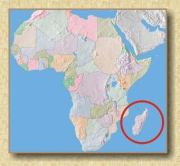Before I received my country invitation, I imagined my life in the Peace Corps to be like me living in a hut on the moon. I’d be in a barren, lifeless African country isolated from mankind.
Then when I received my invitation for Madagascar, my image of my future life in the Peace Corps changed. I still imagined me living in a hut on the moon, but now there were lemurs. Me, hut, moon, lemurs. Maybe bananas, but now I’m pushing it.
So I’ve been doing some research on what my Malagasy life could be like when I arrive there in June. I’ve sought out other Peace Corps Madagascar blogs, checked out photos of Madagascar, read the Peace Corps handbook and welcome book and so on. Here’s what I’ve gathered since I last left you:
I may not be as isolated from humanity as I thought I would be. It sounds like English teachers are placed in higher population density locations than, say, environmental workers. My country invitation said I would probably be living in a city or large village, which is a better circumstance to me than my sitting in the middle of nowhere talking with my best friend Maggie, my Magnavox short-wave radio. I’m eager to interact with the Malagasy since I want to become a full-fledged Malagasy culture expert by the time I leave the island in July 2010.
There may not even be a hut on my moon. Some volunteers live in cement-made shanties with electrical power. Being an aspiring luddite of sorts, I wouldn’t mind living in a place without electricity. The lack of running water will be the biggest challenge for me, though. I’m very fond of hot showers, toilets, and tea—perhaps not in that order—in the United States. My living conditions will again depend on where I’m stationed after my three months of training, but know that I will likely be taking bucket showers and using an outdoor pit latrine. But I’ve also read that the Malagasy grow their own tea leaves—phew!
And speaking of culinary indulgences, the food in Madagascar sounds fantastic. Its base is rice with many types of vegetables and fruits. Mangoes, zucchini, peanuts, bananas, coffee, sugar, breads, and zebu (a strain of cattle) meat sound like normal foods for eating in the island. I read I’ll be routinely cleaning my home’s floors with a half-piece of coconut, so unless it’s strictly used as a household cleaning product, coconuts are another element of Malagasy cuisine. My curiosity is also piqued by a homemade yogurt drink found throughout Madagascar.
Christianity isn’t even the dominant religion of Madagascar. A little more than half of the Malagasy are animists, a ceremonial-based religion that differs in practice among the tribal regions of the island. I won’t even pretend I know what animism is, but I read that they have a regular ceremony of digging up the dead, performing a ceremony on their bodies, and reburying them. Christianity is the religion of about 40% of the population, and the rest is largely Muslim.
“The practices of fady, a ritualized system of taboos and cultural mores combined with ancestral veneration, have tremendous significance for Malagasy, though there will, of course, be differences in the degree depending on your location.” I’ve read a little about fady. It sounds like these taboos deal with wearing certain colors or articles of clothing in public. But I’ll leave it at that since I’m sure you’ll hear plenty about these taboos when I begin living in the country.
Since Madagascar is enormous, it has many regions with cultural, linguistic, and climate differences. My life in the country will depend on where I’m placed. No matter how much research I do, there will still be uncertainty and mystery in store for me—but that’s what I want. A novel isn’t nearly as enjoyable when you already know its plot.




Hey Just checked out your website! Looks great! I am a PCV in Lesotho and I have set up a WIKI for the volunteers in the Southern Africa Region. You should check it out at
http://www.wikisarvn.pbwiki.com
If you want you can pass this site on to friends and family members. It will hopefully become a home for all of us volunteers! Let all your fellow PCV’s know about it too. All the best
Jason Samuelian
Hello Jordon:
Just got caught up on your blog. Looks like mostly females reply to you. Is that an indication of something???
While reading through the comments, I noticed one person referred to you as ‘stinker’. There must be a good story behind that. Probably a relative.
Did my wife’s cousin Jeff get in touch with you.
TTYL.
Ron